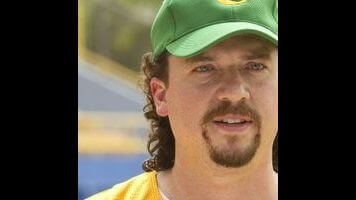Last week we got to see Kenny Powers at his very worst. This was in sharp contrast to his default state of mere badness. When I think of anti-heroes like Kenny, I’m reminded of the title of a Marjoe Gortner album from the early 1970s called Bad, But Not Evil. Gortner was, of course, the child evangelist turned actor/musician/countercultural man-about town in the 1970s. As the album title suggests, Gortner considered himself a badass but not a force for evil in the universe.
I think of Kenny Powers the same way, though last week he crossed the line separating bad from evil when he bullied Stevie into breaking up with his first real girlfriend out of jealousy and a selfish desire to monopolize Stevie’s time and energy, even if he doesn't want him around much of the time. Kenny is too fundamentally pathetic and sad to register as loathsome. His over-the-top bluster is too plainly a manifestation of raging insecurities and self-loathing.
Last night, we got to see the roots of Kenny’s world-class badassery and deep dysfunction. Kenny is no mere mortal; he is a crusader. Yesterday we learned the identity of the man Kenny has been searching for throughout his exile in Mexico (besides, you know, himself, man): his dad.
In an inspired piece of stunt casting, Powers’ dad is played by Don Johnson. Between Eastbound & Down and Machete, it looks like Johnson is finally ready to embrace being a camp icon. To say that Kenny is a chip off the old black is both a groaning cliché that I would never use and an understatement.
Kenny has clearly spent his entire life trying to be his dad and failing miserably. As I wrote in my memoir, A Big Rewind: A Memoir Brought to You By Pop Culture, meeting someone’s parents for the first time answers two important questions:
1. Where did this person come from?
2. How did they get so hopelessly fucked up?
Meeting Kenny’s father answered both of these questions succinctly and convincingly. Kenny and his father speak almost identically; there’s a confrontational, rat-a-tat, swaggering rhythm to their aggressive banter they both share.
Johnson received an appropriately iconic introduction when he reconnects with Kenny and, with a shit-eating grin plastered on his smirking visage, describes Kenny as the same as he’s always been: ten pounds of shit shoved in a five pound bag and friends with faggots.
Kenny has been trying to win the love and adulation of the entire world (mere respect or fondness is never enough) because dad never went to his little league games and probably tried to fuck his high school girlfriend. Kenny wants to be his dad just as desperately as Stevie wants to be Kenny even if his dad is a raging prick who puts on a flashy front even as he’s the kept man of a wealthy and indulgent partner.
Our intrepid anti-hero licks his wounds and hides out from the world by smoking joints and riding around on ATVs. Kenny has spent Eastbound & Down trying to recapture his lost glory but last night, for the very first time, he seemed all but resigned to giving up altogether and devoting himself to a life unencumbered by meaning or value like his dad’s.
Eastbound & Down is as auteurist as television gets. It’s gorgeously directed by Jody Hill and David Gordon Green (and sometimes Adam McKay), both of whom have made slow-motion montages set to ass-kicking seventies cock-rock songs of the 1970s the show’s visual signature. You’d imagine it’d get tiresome after a while but the image of Kenny ecstatically channeling his inner Hot Wheels driver on an RV alongside dear old dad never get old. Neither does Eastbound & Down, no matter where its weird, ambling, shambling, impeccably shaggy path it takes.

 Keep scrolling for more great stories.
Keep scrolling for more great stories.
